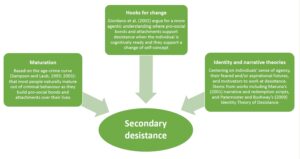For today’s post, I have reproduced in full a recent (19 September 2017) speech by Probation Chief Inspector Dame Glenys Stacey on what is wrong with the probation service and what the Inspectorate aims to do to try to get it back on the right path.
Probation matters
Well over a quarter of a million people are supervised by youth offending and probation services each year. Many under probation supervision are not receiving the quality of services that they should, and yet we know that good probation services can change their lives and life chances.
Good youth offending and probation services also make a big difference to society as a whole. If all these services were delivered well, then the prison population would reduce, there would be fewer people sofa surfing or sleeping or begging on the streets, and fewer confused and lonely children and young people. Men, women and children currently afraid of assault could lead happier and safer lives, and yes, there would be less reoffending. These things really do matter – to those under probation supervision, to all of us working in criminal justice, and to society as a whole.

A lack of quality
But probation services are not being delivered consistently to the standard we expect. The National Probation Service, responsible for those assessed as high risk, it is delivering to an acceptable standard overall, although there are inconsistencies in the quality of work across the country, and some anomalies as well.
The majority of individuals, however, are categorized as medium or low risk, and although there are exceptions, the Community Rehabilitation Companies responsible for their supervision are not generally producing good quality work, not at all. Probation reform has not delivered the benefits that Transforming Rehabilitation promised, so far.
We rarely see the innovations expected to come with freeing up the market, and instead proposed new models, new ways of delivering probation services on the ground and supporting them with better IT systems have largely stalled. The voluntary and charitable sectors are much less engaged then government envisaged. Promised improvements in Through the Gate resettlement – mentors, real help with accommodation, education, training and employment for short sentence prisoners – have mostly not been delivered in any meaningful way. And too often, for those under probation supervision we find too little is done by CRCs. On inspection, we often find nowhere near enough purposeful activity or targeted intervention or even plain, personal contact.
Why is this?
Staff morale, workloads, training and line management are highly variable and need to improve if probation is to improve. Staff are change weary and more than that, too many are too overburdened with work. Their employing companies are financially stretched, with some unable to balance the books, as unexpected changes in the type of cases coming their way have resulted in lower payments than anticipated.
What to do?
The government must face this squarely, knowing that CRC contracts are currently set to run until late 2021. It must consider its options, in order for there to be any prospect of consistently good probation services nationwide.
Of course, these companies strive to meet performance targets set by contract – just as they should. That is the nature of contracts. Many achieve well against some of those targets, but often enough this is at a cost to the quality of work and the more enduring expectations we all have of probation services.
To give one example, CRCs commonly produce timely sentence plans, and so meet contract expectations, but those plans may not be good plans, comprehensive plans, based on a comprehensive assessment.
What is more, we find too often that despite sometimes heroic efforts by staff, plans are not followed through into action, into real work that can make a material and positive difference.

Measuring success
You would think at first sight that changes to the contract specification would do the trick. But the work that probation services can do locally, with local partners, to deal with complex, sometimes longstanding social problems and some of the most troubled and troubling people in society, so as to make a difference to those individuals’ life chances, this is very difficult to exemplify and then ensure, in a set of performance targets or measures.
This measurement problem is not unique to probation. Other caring professions may be equally difficult to measure, to quantify in this way, and for these type of services, independent inspection has a particular role to play.
For such services – probation services delivered in the community or perhaps services caring for the elderly in a care home – nothing beats stepping over the threshold, and looking with an experienced, wise eye at what is going on. In that way, independent inspectors can report objectively and faithfully how things are. They can hold up a mirror and reflect the simple, unadorned picture they see. That is what we do. But that alone does not drive improvement where it is needed, necessarily. Yes, we make recommendations and expect them to be followed, but that is not enough.
Getting improvement
For probation services to improve where needed, a number of other things must happen. Firstly, government must – and it has started to do this – it must address the immediate funding issues, and do so carefully and wisely so as not to fall foul of contract law, so as not to create perverse incentives, and instead to secure more professional staff and specialist intervention services where needed.
Government must also make a plan, have a strategy for how probation services are to be delivered over the next decade. CRC contract end dates are not so far off. And meanwhile it must be as clear as possible about what it expects of probation services, and rebalance the oversight model, the way probation services are overseen, so as to focus squarely on those expectations.
It seems obvious to me that government should expect consistently good quality probation services, so that the public are sufficiently protected, individuals serve their community sentences productively and reoffending is reduced. For me, the problem arises underneath these enduring expectations of probation, as with Transforming Rehabilitation, probation providers were liberated from what were rather processy national standards so as to enable them to innovate.
As a consequence, and without good and commonly accepted national standards there is some confusion about what good looks like – what represents good probation services, and what is expected of probation services, actually. It is time to clarify that, and to fill that gap.

New standards
With government’s backing, we at HMI Probation are developing underpinning standards for probation services. They are not processy. Instead they are evidence based and take the best from international standards. We are developing these standards in a consensual way, working with the NPS and CRCs in particular – as they need to accept and adopt these standards with us, in order to make a difference.
We will inspect against these standards in due course. More than that, we will use them to describe what ‘good’ looks like, to provide some stakes in the ground, ways in which probation providers themselves can see where their services meet expected standards and where they need to improve.
So for example, we can be clear what good Unpaid Work looks like, and what outstanding Unpaid Work looks like – and what is plainly inadequate.
Ratings scale
And as we inspect we will rate NPS divisions and CRCs on a four point scale à la Ofsted:
- Outstanding,
- Good,
- Requires Improvement, and
- Inadequate

Driving improvement
We will do this because research shows that ratings drive improvement in immature or poorly performing markets. In other words, we think it will drive improvement where it is needed, and recognise and applaud good work when we see it as well.
To rate probation providers fairly, we must of course publish our standards and be clear how we will apply them, and of course we will do that, starting with a consultation in November. But we must also be sure of our judgements of probation providers and be sure they are fully reflective of a good evidence base in each inspection.
We will increase our case sample sizes so as to give us an 80% confidence level in case inspection findings, and we will inspect whole CRCs and whole divisions of the NPS. We will routinely inspect not just the long established areas of probation work, but new areas as well: Through the Gate work for example.
And because probation services are still volatile, we will inspect each NPS division and CRC annually, from the spring of next year.
We think that this increased emphasis on independent inspection, and standards will begin to rebalance the way probation providers are overseen. It will make clear what is expected of probation providers, and I have no doubt that most if not all providers will want to attain good independent inspection ratings.
Incidentally, I know that many across the range of criminal justice and wider public services will have mixed views about inspection, about being inspected. Some find it extremely burdensome, and in some services there is an industry in mock inspection, and preparing for inspection. Of course we expect organisations to be ready for inspection, but we don’t encourage over-prep.
We can often see, you know, the wet paint.
Inspectors have generally been inspected themselves, in their former lives, and know the game. I do urge against any overly enthusiastic approach to preparing for inspection. As HMI Probation will be inspecting annually, it is perhaps best to be proportionate in preparing for it, and then take it as it comes – something I will be stressing with probation leaders.
A co-ordinated approach
As I have said, I think our development of probation standards and more regular inspection are positive developments, capable of driving improvement where it is needed, but without further changes, the water remains muddy.
CRCs could feel conflicted, with our inspection standards on the one hand and then contract requirements on the other. And many remain financially stretched. Two additional things need to happen, in my view, to give us all the best prospect of success.
Firstly, CRCs must be put on a sufficiently stable financial footing. I have no doubt this is not straightforward: existing contracts and contract law must necessarily constrain matters, and there is a trick for government to pull off, if CRCs are to better funded and at the same incentivised to produce quality work.
And that for me is the second requirement – incentivisation. CRCs could be incentivized to produce quality work, exemplified by higher order HMI Probation ratings. For those achieving higher order ratings, there should be some recognition of that, and reward as well. That may come for example in the way they are then overseen, perhaps by a reduction in the overall oversight burden. Rewards don’t always have to be monetary, as we all know.
We are talking to government about these things. We are hopeful that government will find ways to incentivise and reward higher order HMI Probation ratings. And meanwhile we continue to inspect and report, while developing and agreeing new standards for probation that should over time mean that more people receive good quality probation services, to benefit them and society as a whole.









One Response
Unfortunately Probation CRC in there current form will never improve so long as they are beholden to share holders . They strive to meet targets that have no relation to the actual work done and improve peoples lives will continue, companies will continue to cut corners to increase profit margins.
TR is the biggest failure and madness and no one will do anything to improve it.